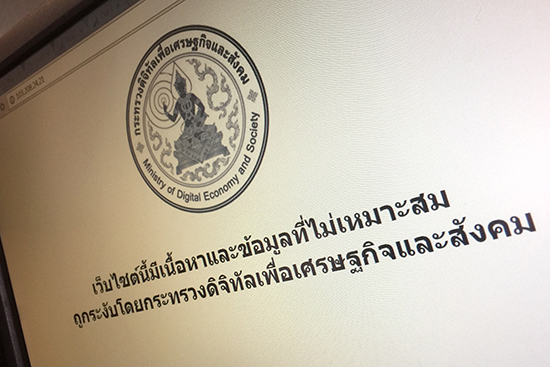Bangkok, December 16, 2016–Thailand’s cabinet and king should scrap legislation that would give authorities sweeping new powers to censor the internet based on vague and broad criteria, the Committee to Protect Journalists said today. The military-appointed National Legislative Assembly today passed amendments to the 2007 Computer Crime Act that would severely restrict Thais’ rights to privacy and to freely impart and receive information.
The legislation aims to harmonize Thai law with recent technological advances but also includes several provisions that invite abuse. Section 14 of the amended law imposes a maximum penalty of five years in prison and fines for entering “false” information into computer systems that could “damage national security, public safety, economic security, public services and infrastructure, or cause panic among the public,” according to press reports. Another provision would allow state officials to obtain internet users’ data from service providers without a court order, the reports said.
Amendments to the law would also enable the government to create a new five-member committee tasked with monitoring online platforms, including social media, for content that could undermine “public order,” national security, or “public morals,” without clearly defining those terms, according to news reports. Reuters reported that the screening panel would be able to “remove” or “suspend” a website that it deems a threat to national security or public morals–even if the website’s content does not explicitly violate any existing laws. Prior to the amendments, the law required officials to receive a court order to remove content, Reuters reported.
“Thailand’s cybercrime law was already a grave threat to journalists who work online. These vague and overbroad amendments will only accentuate the danger,” said Shawn Crispin, CPJ’s senior Southeast Asia representative. “Thailand’s military government consistently conflates commentary with criminal activity, and these amendments will give officials even wider powers to crush dissent. These amendments should be scrapped, and any future changes to the law should prioritize explicit guarantees of press freedom and freedom of expression.”
Prime Minister Prayuth Chan-ocha yesterday defended the amendments, and denied they would curb online liberties and rights, Reuters reported. He said the Computer Crime Act’s strengthened provisions would be used only against those who violate the law, the report said. The amendments will next be forwarded to Prayuth’s cabinet for approval before being submitted for royal endorsement and enacted into law, according to news reports.
CPJ has found that laws intended to apply penal codes to online activity often criminalize the standard practices of online journalists. While justified as a means of preventing terrorism or promoting stability, the laws are also often used to restrict information critical of or sensitive to government officials. Thai activists collected more than 300,000 signatures in a petition presented to parliament, calling on legislators to reconsider the law’s amendments, according to news reports.
Prayuth’s military administration has broadened its censorship of the internet since the October 13 death of King Bhumibol Adulyadej. Authorities told The Associated Press they had blocked access to more than 1,300 websites containing content they deemed anti-royal in the month after Bhumibol’s death, more than they had censored in the previous five years combined. CPJ research shows that the Computer Crime Act is often used by officials to enforce Thailand’s strict lèse-majesté law, which allows for 15-year prison terms for violations, and to harass journalists with criminal cases.
